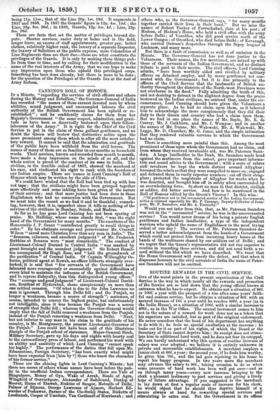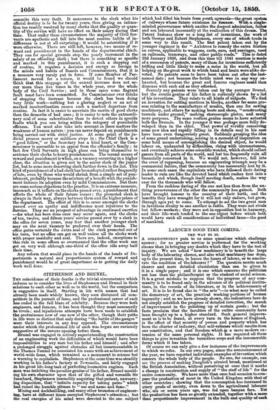ROUTINE REWARDS IN THE CIVIL SERVICE.
On of the worst points in the present organization of the Civil Service is the way in which nearly all the rewards and promotion of the Service are so laid down that the young official knows at entrance what he has to expect. He obtains not a situation of 801. or 1001. a year with the prospect of a rise after some years' faith- ful and zealous service, but he obtains a situation of 80/. with an assured increase of 16/. a year until he reaches 4001. a year (as in the India House), or a situation of 100/. with a similar increase to 4001., as in the War Office. The annual increment comes to him not in the nature of a reward for work done nor as a token that his superiors are satisfied, but as part of the original endowment. He never considers that the head of his department has anything to do with it ; he feels no special exultation at the increase ; he looks out for it as part of his rights, of which the Board or the Secretary of State cannot deprive him ; its receipt does not stimu- late him to additional hard work, and he does not fear its estoppel. We can hardly understand why this system of routine increase of salary was ever adopted ; we believe it is entirely unknown in private and mercantile establishments. A merchant employs a Junior clerk at 60/. a year ; the second year, if he finds him worthy, he gives him 70/., and the lad goes rejoicing to his home to report his happy progress. In two years more the merchant may advance the salary to 90/., taking occasion to do so when some pressure of hara work has been well got over—and so on through many years—every new increase bringing to the clerk a pleasant testimony to past services and giving a lively hope of future advantage. If you suggested to the merchant to lay down at first a regular scale of increase for his clerk, he would object that he should thus deprive himself of a means always at hand for rewarding special services and stimulating to extra zeal. But the Government in its offices
commits this very fault. It announces to the clerk what his official destiny is to be for twenty years, thus giving an intima-
tion too readily received by many clerks that the quality or quan-
tity of the service will have no effect on their salary during that time. That under these circumstances the majority of Civil Ser-
vants are apathetic and fall into the most routine habits of in- difference is not at all surprising- it would be astoniehing if it were otherwise. There are still left, however, two means of re- ward and punishment in the hands of the departmental chiefs. They can for special grounds stop the yearly increment in the ' salary of an offending clerk; but there is something so .specific and marked in this punishment, it is such a stepping out' of routine it requires a decision and energy so foreign to'
the mind; and habits of Boards and Commissioners, that it is a measure very rarely put in force. If some Member of Par- liament moved for a return, it would be found we shoukl
think that this -stoppage of the annual increase does not oc- cur more -than five tunes in the whole year, over the whole
body of the Civil Service ; and in those cases some flagrant fault must have been committed. No Comniissioner ever thinks of stopping the increase because the clerk has been doing very little work—nothing but a glaring neglect or an act of marked insubordination causes such a marked departure from routine. In fact it is easier to ascertain the merits of good clerks than the demerits of had ones ; it is easier to note the extraordi- nary zeal of some subordinates than to detect others in specific faults which you can bring within the category of punishable offences. You must also take into account an these matters the weakness of human nature : you can never depend DR punishments being carried out with strict justice. At some point of the ju- dicial process mercy or mildness steps in ; the Chief Clerk is a "good fellow," or the Secretary has a kind heart, or the Com- missioner is aooessible to an appeal from the offender's family ; in tact few Civil Servants in high place can bring themselves to sentence their clerks to heavypunishments. The second means of reward and punishment is when, on a vacancy occurring in a higher class, the situation is given not to the senior clerk of the junior list, but to some more deserving clerk further down in &elate This kind of punishment of abed clerklias heenadopted rather frequently of late, even by those who would shrink from a simple act of 1,1112- iyhment, probably because the mixture of a benefit with fhe puniSh- ment induces its adoption even by mild Commissioners. Mut there are some serious objections to the practice. It is an extrememeasure, inasmuch as it inffiets on the clerks passed over, apunishment that affects the whole of their future career ; the promoted clerk is always in their way, always between them andthe higher prizes of The (department. The effect of this is to cause amongst the clerks passed over an apathy and indifferenee most injurious to the
Servioe. They _see no proepeat of advantage in continued exertion —for what has been done once may occur again, and the clerks of ten, twelve, and fifteen years' service passed over by a clerk in the offioe for seven years, may fear that another younger clerk may on the next vacancy be preferred over their heads. The office gains certainly the extra zeal of the clerk promoted out of his turn, but no office can get on well unleee all its clerks work with proper assiduity and zeal. There are, indeed, exceptions to this rule in some offices so overmanned that the office work can get on very well although one-third of the office idle away half their time.
Any reform that would plate in the hands of the heads of De- partments a natural and proportionate system of reward and punishment would be of great importance as to getting the daily work well done.



























 Previous page
Previous page